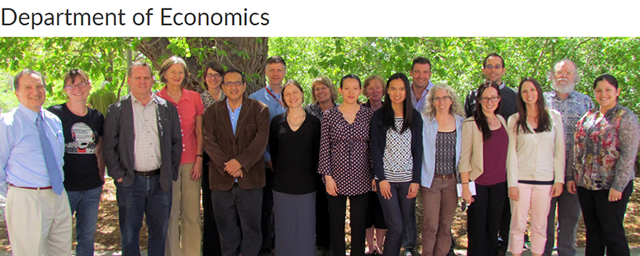
Economics ETDs
Publication Date
7-22-1976
Abstract
It is universally suggested that cancer is suspected of being environmentally induced. The economic risk associated with exposure to suspected environmental carcinogens is not yet analyzed. Although several researchers have estimated the health damages of certain pollutants, an appropriate methodology to estimate the economic damages of suspected carcinogens is not yet developed.
The theoretical model developed in this dissertation analyzes the economic risk of exposure to suspected environmental carcinogens. The important conclusion drawn from the theoretical model is that exposure to environmental carcinogens at earlier stages of life should be optimally avoided. The theoretical model provides a basis for the empirical estimation of marginal increases in the risk of cancer incidence attributable to environmental factors.
The risk of cancer associated with suspected carcinogens is estimated according to a cross-sectional statistical study. This study was conducted to examine the correlation between cancer mortality in 60 selected U.S. cities and a host of carefully chosen environmental factors. The statistical model is unique and innovative. It includes many relevant independent variables to avoid spurious relationships; since it is evident that suspected environmental carcinogens are numerous. The independent variables considered fall into 3 broad categories -- socioeconomic, eating habits and life style, and environmental quality variables. The model is also lagged to establish a reliable relationship between cancer and environmental factors since it is evident that cancer has a relatively long latency period.
The atmospheric concentration of suspended particulates and ammonium as well as beef, pork, and cigarette consumption are found to be significantly correlated with several cancer categories. Since tobacco smoke contains nitrosamines and pork products contain nitrates -- precursors to nitrosamines perhaps the carcinogenic effect of nitrosamines is reflected in pork and cigarette consumption.
Economic damages from pork and cigarette consumption are found to exceed consumer expenditures on these items. The economic damages of environmental factors are assessed as the product of the risk of cancer associated with environmental factors and the value of increased risk of death, rather than lost earnings. The value of increased risk of death is estimated from market observations made by Thaler and Rosen. The following actions are recommended:
1) The public should be warned about the suspected health hazards of nitrate-containing food items.
2) The high level of correlation between cigarette consumption and various cancer categories should be further emphasized.
3) A serious attempt should be made to identify suspected carcinogenic agents and reduce their ambient level or remove them from the environment if such action is economically optimal.
Degree Name
Economics
Level of Degree
Doctoral
Department Name
Department of Economics
First Committee Member (Chair)
William Dietrich Schulze
Second Committee Member
Shaul Ben David
Third Committee Member
Allen V. Kneese
Language
English
Document Type
Dissertation
Recommended Citation
Pazand, Reza. "Environmental Carcinogenesis: An Economic Analysis Of Risk." (1976). https://digitalrepository.unm.edu/econ_etds/118


